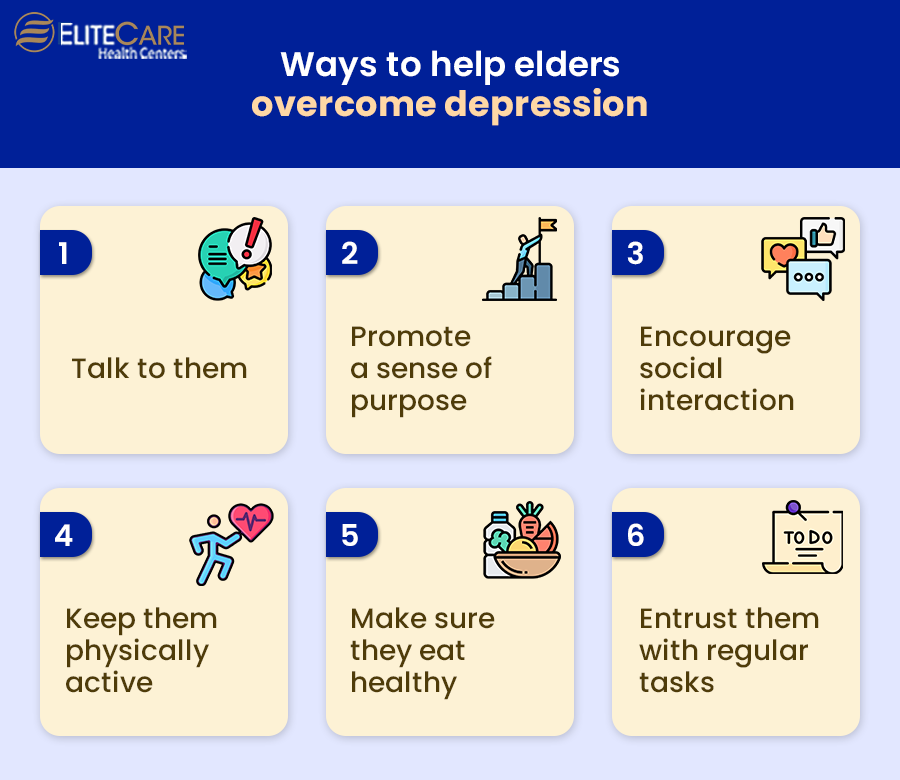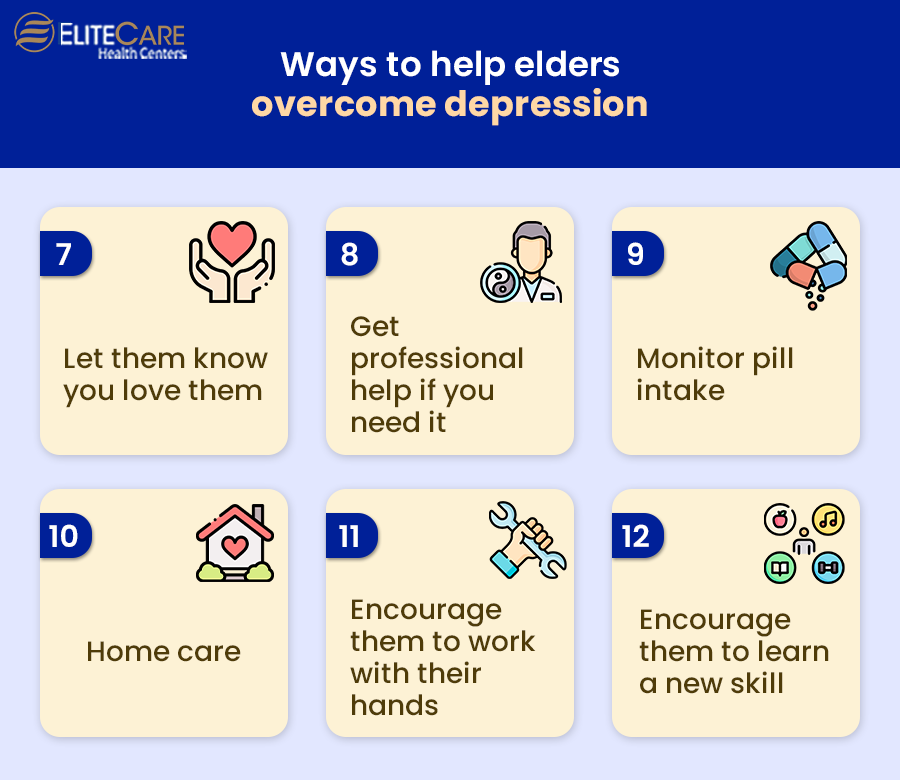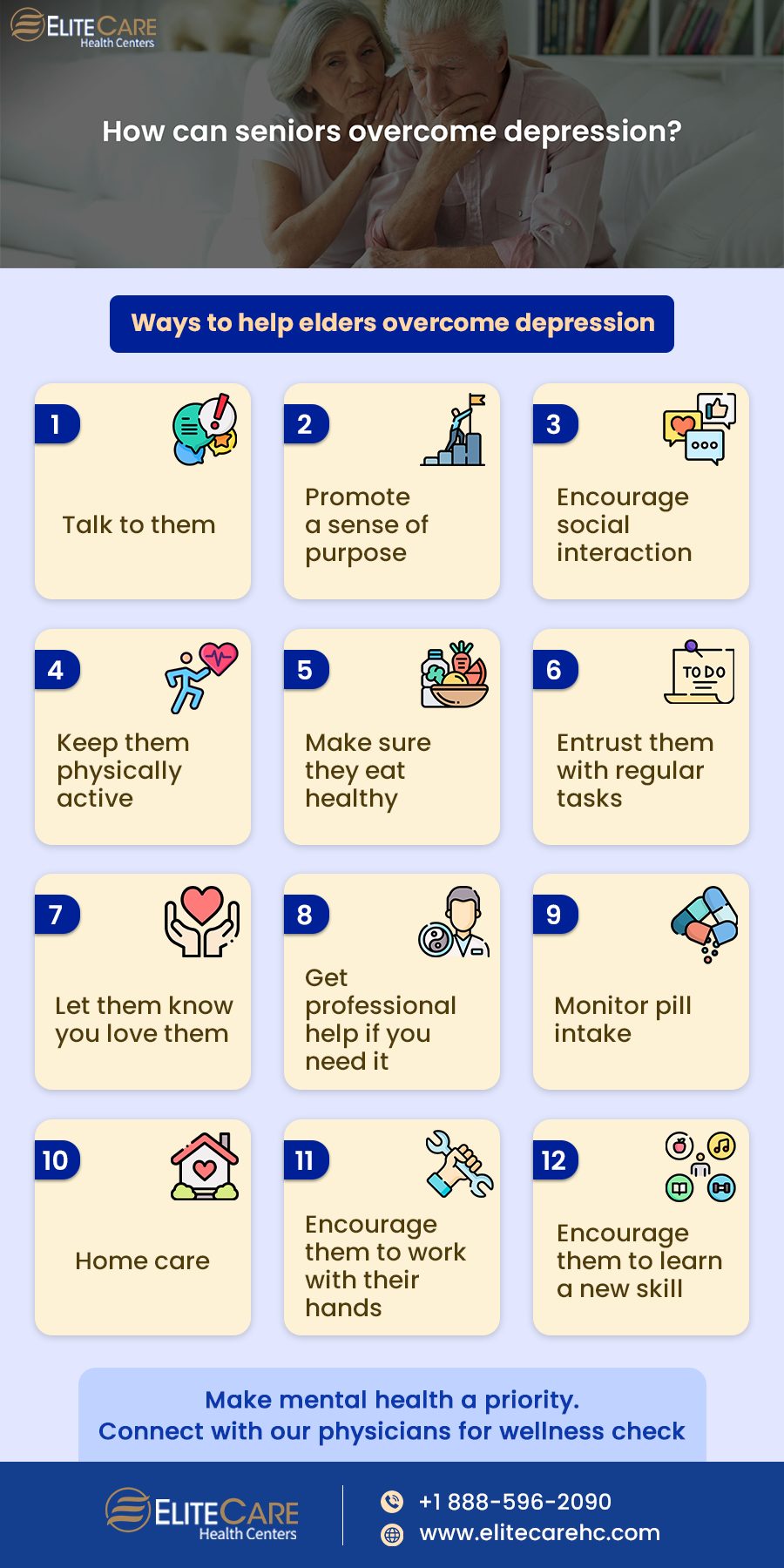
Depression in seniors is often mistaken for the side effects of many illnesses and medications used to treat them, resulting in late diagnosis and treatment. Read on about depression in seniors, their symptoms, solutions, and practical ways to overcome them.
Signs of depression in seniors
Has your senior loved one stopped doing a routine activity that he enjoyed, stating that it is too much trouble? Understand the warning signs and symptoms early to identify depression. Here are a few red flags that mark the onset of depression:
- Sadness or deep despair
- Unknown or worsening aches and discomfort
- Inactivity or loss of interest in hobbies
- Loss of appetite or weight
- A sense of powerlessness
- Lack of drive and vitality
- Sleep disruptions (difficulty falling asleep or staying asleep, oversleeping, or daytime sleepiness)
- Decline in self-worth (worries about being a burden, feelings of worthlessness or self-loathing)
- Slow speech or action
- Thoughts of suicide
- Memory issues
- Neglecting personal hygiene (skipping meals, forgetting meds, neglecting personal hygiene)
How is Depression Different for Older Adults?
Depression in the elderly might be difficult to identify. Seniors who are frequently depressed find it difficult to express their feelings. Additionally, the current generation of senior citizens in the United States grew up when depression was unrecognized as a biological problem and medical illness. As a result, some people worry that they will be branded ‘crazy’ or their sickness equated to a weakness in character.
Depression is often associated with suicide in seniors. Compared to other age groups, older people commit suicide more frequently. Senior men (75+) are at the highest risk (40.5 per 100,000). White men over 80 have a six-fold higher risk than the general population. Hence, always take seniors’ attempts at suicide, or serious death thoughts seriously.
On the bright side, 80% of depressed people recover and resume their normal lives after receiving proper diagnosis and treatment for depression. Here are the top 12 ways for seniors to fight depression.
12 ways to help elders overcome depression

1. Talk to them
Have an open conversation with seniors regarding their feelings and any conditions they are not acknowledging or disclosing outright. It is important to listen more and talk less while understanding their feelings.
2. Promote a sense of purpose
Depression affects people far more severely when they have lost their sense of purpose in life. Encouraging seniors to take up a pastime like knitting or gardening can help prevent loneliness and brooding. Additionally, persuade them to try out social pastimes like card games, yoga, or charitable volunteer work in their community.
3. Encourage social interaction
Encourage seniors to see friends and relatives, participate in group trips, and go to local events rather than letting them handle their sadness on their own. Studies show that having an active social life improves one’s physical, mental, and emotional well-being.
4. Keep them physically active
Research reveals that physical activity (aerobic exercises) can improve mental health in seniors. Seniors can maintain physical, mental, and emotional health by engaging in gentle exercises like walking, stair climbing, and workouts that are appropriate for their age. Group exercises, such as yoga or tai chi, are suitable options for depressed seniors as they might meet people who share their interests.
5. Make sure they eat healthy
Lean protein, complete grains, and fiber-rich foods like fruits and vegetables are essential for seniors. Limit sugar, carbohydrates, and harmful fats, and serve lightly cooked veggies. Also, a lack of vitamin B is linked with depression, hence promoting foods like meat, fish, poultry, potatoes, and whole grains that are rich in vitamin B.
Read More: Can Food Improve Your Brain Health?
6. Entrust them with regular tasks
Seniors who live alone frequently become consumed by a wave of pessimism. A simple task can make all the difference. A dog is an ideal companion, since it will keep them physically busy, make them feel loved and needed, and promote social interaction. Routine chores like cleaning the house can help remove the clutter and keep them busy.

7. Let them know you love them.
Shower seniors with lots of love. Hugging and other expressions of love can make a difference and help them heal, especially for widowed seniors coping with loss.
8. Get professional help if you need it
Depression can worsen when there is a decrease in appetite and behavioral changes. If you believe the senior’s disorder is out of control, speak with a mental health expert and have the senior enroll in counseling.
9. Monitor pill intake
If a senior suffers from depression and takes antidepressants, ensure they take their prescription medicines as prescribed and follow the doctor’s instructions regarding dose, lifestyle, and nutrition. Remind them to take their daily dose as directed and to check the medicine cabinet for any signs of pill misuse or missed doses.
10. Home care
For elderly family members living independently, it is advisable to hire someone who can visit once a day to assist seniors with daily tasks like food preparation, shopping, and taking a shower. It also lets them have an interaction with the outer world and people.
11. Encourage them to work with their hands
Working with the hands has proven to have a positive impact on seniors. Activities like knitting, quilting, and gardening can help improve physical and mental health. It adds a feeling of accomplishment and fosters creativity among seniors.
12. Encourage them to learn a new skill
Learning new things not only makes life more meaningful and enjoyable, but it can also support brain health and stave off mental decline. Motivate seniors to learn a musical instrument, a new language, or a new sport.
Conclusion
There are no clear guidelines on how to live your life in order to avoid depression, and there is no “one-size-fits-all” treatment for depression or any other mental health problem. Make sure your loved one receives a proper diagnosis and treatment and be patient and kind as you listen to them. Find a doctor and go with the seniors to appointments to provide emotional support.
For the best primary care and wellness services in Florida, visit your nearest EliteCare Health Centers to schedule an appointment.
- Tags:best healthcare in floridahealth and wellness centerhealth and wellness serviceshealth care centerknee pain treatmentmedical cliniconline doctor consultationpreventive careprimary careprimary care physicianprimary care servicesprimary servicessenior care servicessigns of depressiontreatment for depression






